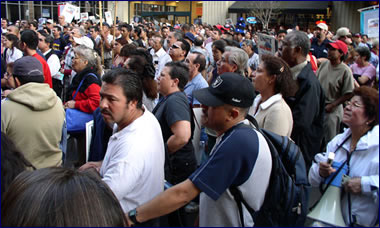Arrestos masivos cuando sindicalistas de LA manifiestan en apoyo de trabajadores hoteleros de San Francisco/Empleadores prolongan el cierre patronal
11-Oct-2004
La policía en LA
 Cuarenta y cuatro miembros y partidarios sindicales hoteleros de Los Ángeles fueron arrestados en una demostración en apoyo de los miembros UNITE HERE que se encuentran en huelga y bajo cierre patronal en San Francisco. el 5 de octubre. El mitin reunió a unos 1.000 sindicalistas, partidarios de los derechos laborales y activistas comunitarios y de los derechos civiles ante el Hotel Hyatt Regency en el centro de la ciudad, donde la policía realizó arrestos masivos al no dispersarse los manifestantes cuando la policía dio la orden.
Cuarenta y cuatro miembros y partidarios sindicales hoteleros de Los Ángeles fueron arrestados en una demostración en apoyo de los miembros UNITE HERE que se encuentran en huelga y bajo cierre patronal en San Francisco. el 5 de octubre. El mitin reunió a unos 1.000 sindicalistas, partidarios de los derechos laborales y activistas comunitarios y de los derechos civiles ante el Hotel Hyatt Regency en el centro de la ciudad, donde la policía realizó arrestos masivos al no dispersarse los manifestantes cuando la policía dio la orden.El mismo día, el grupo de empleadores de la ciudad que representa a los 14 mayores hoteles, votó la continuación del cierre forzoso contra 4.000 miembros del Local 2 de UNITE HERE en San Francisco, más allá del plazo del 13 de octubre estipulado por el sindicato para finalizar la huelga que inició el paro patronal más extenso. Los empleadores hoteleros de San Francisco rechazaron las negociaciones en favor de una fecha de expiración de dos años para un nuevo convenio colectivo, lo que brindaría una fecha conjunta de expiración con los hoteles de 10 importantes ciudades de EE.UU. y, por tanto, incrementaría el poder de negociación nacional con las cadenas que ahora dominan el sector.
UNITE HERE está concentrándose a nivel nacional en cuatro cadenas hoteleras clave que son importantes empleadoras y que están dirigiendo la oposición contra las reclamaciones de negociación sindical. Las cuatro cadenas son: InterContinental, Starwood, Marriott y Hyatt.
Arrestations massives lors dune manifestation à LA en faveur des travailleurs/euses de lhôtellerie de San Francisco/Les employeurs prolongent le lock-out
11-Oct-2004

Quarante-quatre membres et sympathisants/tes des syndicats de lhôtellerie de Los Angeles ont été arrêtés/es le 5 octobre lors dune manifestation de soutien aux membres de UNITE HERE en grève et en lock-out à San Francisco. La manifestation réunissait quelques mille syndiqués/es, partisans/nes des droits syndicaux et militants/tes des droits communautaires et civils devant lhôtel Hyatt Regency du centre-ville, et la police est intervenue pour procéder à des arrestations massives après que les manifestants/es naient pas répondu à lordre de se disperser donné par la police.
Le même jour, le groupe demployeurs représentant les 14 principaux hôtels de la ville a voté en faveur de la poursuite du lock-out des 4000 membres de la section locale 2 (San Francisco) de UNITE HERE au-delà du 13 octobre, date fixée par le syndicat pour la fin de la grève qui avait incité les employeurs à décréter un lock-out plus large. Les employeurs de lhôtellerie de San Francisco ont refusé de négocier une nouvelle convention expirant dans deux ans, ce qui aurait permis d'harmoniser la date dexpiration des conventions collectives des hôtels de dix grandes villes des États-Unis, augmentant ainsi le pouvoir de négociation à léchelle nationale avec les grandes chaînes hôtelières qui dominent aujourdhui le secteur.
À léchelle nationale, UNITE HERE concentre ses efforts sur quatre grandes chaînes hôtelières, qui sont des employeurs importants et qui mènent lopposition aux demandes syndicales : InterContinental, Starwood, Marriott et Hyatt.
Support South African Brewery Workers!
11-Oct-2004The South African Food and Allied Workers' Union (FAWU) has asked for international support in a conflict over rights at the brewery transnational SABMiller, formerly South African Breweries.
In 2001, the company carried out a major restructuring exercise at five breweries under its ongoing "World Class Manufacturing" program. At the Cape Town Newlands plant, 138 workers - with an average 10 years of service - were laid off for allegedly failing to possess the requisite skills or qualifications to continue with the company. The union opposed the layoffs, pointing out that they contravened existing collective agreements with the company and violated important post-Apartheid legislation designed to protect workers. The Skills Development Act and the Employment Equity Act, which are designed to address the specific problems of workers disadvantaged by Apartheid's discriminatory education policy, require companies to train and retrain workers within the context of restructuring or changes in the production process.
When the company proceeded to disregard FAWU's objections and go ahead with the retrenchments, the union contested the legality of the restructuring exercise in the Cape Town Labour Court. On September 3, the court ruled in favor of the workers and their union. One group of workers is to be reinstated with back pay, while another group is to receive monetary compensation in view of procedural violations in their cases. The court instructed the company to pay FAWU's court costs and legal fees (amounting to some SAR 1 million, or over USD 150,000.00).
On September 14, SABMiller informed FAWU of their intention to appeal the judgement. Since that date, it has filed the appeal.
An appeal not only throws the financial burden of contesting the layoffs back on the union. It imposes even greater hardship on these 138 workers and their families at a time of record unemployment, since the appeal process can take from 3 to 5 years. During this period, retrenched workers would not be reinstated, nor would any workers receive financial compensation. Appealing the decision nullifies efforts to fight past and current retrenchments at the other SABMiller plants under pressure from "World Class" downsizing. FAWU doesn't dispute the company's right to appeal a court decision, but points out that this is happening at a time when many transnational companies in the country apparently hope to blunt legislation they regard as excessively favorable to workers by carrying appeals to the highest judicial level. For FAWU and the South African trade union movement, The Skills Development and Employment Equity Acts are essential instruments for reversing decades of brutal discrimination. FAWU has therefore asked for international support and solidarity.
Act Now!
Send a message (in English) to SABMiller's head of industrial relations, demanding the company drop its appeal. You can send the message by clicking here. Copies will be automatically sent to FAWU and to the IUF secretariat.
We thank you in advance for your solidarity and support.
To: Mr. Kobus Burger, Industrial Relations Manager, SABMiller
Dear Sir,
We have learned of your company's appeal of the September 3 ruling in the Cape Town Labour Court concerning the illegality of the 2001 retrenchments of workers at the Newlands plant. Appealing this decision is tantamount to punishing workers - many of them with long service to your company - for the inequalities and discriminatory policies of the Apartheid era. Further, the Court upheld FAWU's argument that the Skills Development and Employment Acts requires companies to retrain rather than retrench in the context of changes to production methods. Contesting this principle is widely perceived as a rejection of two of the most important legal instruments adopted as policy tools in democratic, post-Apartheid South Africa.
We therefore urge you to abide by the decision of the Court and drop your appeal of this judgement.
Sincerely
Transnational and Indian Companies Profiting from Massive Child Labour in Cottonseed Production
10-Oct-2004Two new reports from the India Committee of the Netherlands document the persistence of massive child labour in transnational and Indian companies involved in cottonseed production. The Committee's report on cottonseed farms in Andhra Pradesh shows an estimated 12,375 children working "in horrendous conditions" on farms producing for the following TNCs: Advanta (Dutch), Bayer (German), Emergent Genetics (US, with co-investment from Anglo-Dutch Unilever) and Monsanto (US). The children work long hours, do not attend school and face death and illness through pesticide exposure. Some 70% of the child workers are in debt bondage to their employers. Investigators found an additional 70,000 children working under similar circumstances for Indian companies.
A second report shows an estimated 117,800 children under 15 working on cottonseed farms producing for Indian and transnational companies in the states of Gujarat and Karnataka.
The companies promised measures to eradicate child labour in response to public outrage after a report last year found that children constituted up to 90% of the labour force in the cottonseed industry in Andhra Pradesh. The latest reports show that there has been little or no progress. The transnationals in particular have proven reluctant to alter the procurement practices which encourage child and bonded labour. According to the Indian MV Foundation, which is monitoring the situation, the children are "locked in an unequal partnership under contractual relationship with a powerful industry... It has proven time and again beyond doubt that the powerful global players who claim to uphold themselves to their codes of conduct and corporate social responsibility have flouted all norms of human rights and values.
The reports can be downloaded (in English) together with related information at http://www.indianet.nl/katoenz_e.html
Anställda på LSG Sky Chefs strejkar för högre lön och bättre villkor
09-Oct-2004
Cateringanställda strejkar på flygplatser i Spanien, Frankrike och Nya Zeeland
Lufthansas dotterbolag LSG Sky Chefs är störst i världen på flygcatering. LSG Sky Chefs har nyligen varit föremål för strejker runtom i världen när anställda och deras fackföreningar försvarar sig mot företagets försök att sänka standarden, försämra kollektivavtalen, vinna tillbaks terräng från facket, skära ner bemanningen och ersätta fasta jobb med tillfälliga.
Angreppet mot de anställdas rättigheter, mot yrkesmässig och social standard, är företagets spontana svar på trycket från de stora flygbolagen i kölvattnet av krisen för flygbranschen efter 11 september och konkurrensen från lågprisflyget. Fackliga förhandlingsgrupper konfronteras med företagets stelbenta och fantasilösa förhandlingsbud när de försöker tillvarata arbetarnas intressen och hitta lösningar för att rädda jobben och rädda cateringverksamhetens framtid.
De cateringanställda tillhör idag låglönegrupperna jämfört med andra yrken och branscher. När HRF i Sverige bestämde sig för att förbättra situationen i kollektivavtalsrundan 2004 stötte man på patrull när företaget vägrade ge med sig, sa nej till varje höjning av löner och OB-tillägg och krävde lägre lönenivåer för ung personal. Det krävdes strejkhot och påtvingad medling för att få till stånd ett nytt kollektivavtal med acceptabla löneökningar.
24-timmarsstrejker i Spanien
LSG Sky Chefs' anställda på Son Sant Joan-flygplatsen i Palma de Mallorca la ner arbetet tre fredagskvällar i rad och strejkade i 24 timmar den 10, 17 och 24 september. Företagsrådet med medlemmar från FECOHT-CC.OO och FECHTJ-UGT varslade om strejk när företaget vägrade förhandla om att förnya det avtal som löpte ut 28 februari 2004.
Efter ett misslyckat medlingsförsök 9 september genomfördes den första av de tre planerade strejkerna 10 september. Därefter följde flera misslyckade försök att få företaget att på allvar sätta sig vid förhandlingsbordet, och sedan genomfördes de båda andra strejkerna. Förutom att företaget reagerat negativt på förslaget om en löneökning på 2,8% medan alla andra ekonomiska villkor kvarstår oförändrade försöker det tvinga fram flextid något som företagsrådets förhandlare anser är onödigt och oacceptabelt utan att ge något i gengäld. Uppslutningen kring strejkerna var stor bland LSG Sky Chefs' anställda i Palma de Mallorca, och de strejkande fick stöd av övrig personal på flygplatsen.
Konflikt i Paris
LSG Sky Chefs' anställda på Charles de Gaulle-flygplatsen i Paris strejkade tisdagen den 21 september i protest mot godtyckliga disciplinåtgärder och försök från företagets sida att införa "en förtäckt social handlingsplan" genom att avskeda anställda för smärre förseelser. I konflikten 2001-2002 mobiliserade facket massivt mot stora nedskärningar och försök att omintetgöra viktiga kollektivavtalspunkter som arbetarna kämpat länge för att vinna. Företaget svarade med att lockouta runt 900 arbetare, hyrde in beväpnade vakter för att skrämma demonstranterna och sparkade demonstrerande arbetstagare helt olagligt under förevändning av grovt tjänstefel. Trots att företagsledningen byttes ut (mot slutet av konflikten 2002) är läget fortfarandet spänt på LSG Sky Chefs i Frankrike.
Strejker i Nya Zeeland
LSG Sky Chefs' anställda som tillhör fackförbunden SFWU (Service and Food Workers Union) och EMPU (Engineers, Printers and Manufacturers Union) i Nya Zeeland inledde en vecka med roterande strejker den 1 oktober, när 200 arbetare la ner jobbet i Auckland och Christchurch i två timmar. De strejkande i Auckland anslöt sig till en demonstration utanför LSG Sky Chefs' produktionsanläggning i närheten av flygplatsen. Arbetare i Wellington genomför en övertidsblockad. Fler arbetsnedläggelser planeras den 3, 6 och 8 oktober.
Liksom i Sverige och Spanien vägrar LSG Sky Chefs på allvar förhandla om de anställdas krav, som i det här fallet bland annat omfattar en löneökning samt att all övertid ska ersättas med 150%. SFWU och EMPU underrättade LSG Sky Chefs den 15 september att medlemmarna röstat för strejk. Ett medlingsförsök 30 september ledde inte till någon lösning och drygt 400 fackmedlemmar berörs nu av strejken.
TtVXRÌzeJÒxWïÅTWFXÌg®ÆªåÊßßEgpÒbNAEgð·
08-Oct-2004105úATtVXRÌUNITE HERE gõÌXgCLÆbNAEgÌxfÅ44¼ÌTWFXÌzeJggõÆxÒªßß³ê½BWïÉñ1000¼ÌgõAJ xÒAÐïs¯ ̮ƪ¯sÌnCAbg[WFV[zeÉWÜÁ½B±±Éx@ªüè±ÝAx@ªðUð½ßµ½A±êÉ]íÈ©Á½fQÁÒðåÊÉßßµ½B
¯úATtVXRsÌ14Ìå«Èzeðã\·égpÒc̪AgªAå«ÈbNAEgÉÂȪÁ½XgCLðI¹·éÆß½1013úÌúÀðz¦ÄATtVXRUNITE@HERE[J2Ì4000¼ÌgõÌbNAEgðp±·é±Æð̵½BTtVXRÌzegpÒÍ2NÔúÀÌJ¦ñÌðÂðÛµ½B±ÌJ¦ñªÀ»·êÎÄÌPOÌåvssÌzeɤÊ̸øúÀª^¦çêAzeåðxz·éze`F[ÆÌSIÈðÂÍðÁ³¹é±ÆªÅ«éB
]ÁÄAUNITE@HEREÍA±êçÌssÌå«ÈgpÒÅ èAgÌcÌðÂÌvɽεĢéSÂÌå«Èze`F[ÉÅ_ð ÄÄ¢éB@SÂÌ`F[ÆÍAC^[R`l^AX^[EbhA}IbgAnCAbgÅ éB
[<<] ... 698 699 700 701 702 703 704 705 706 707 708 709 710 711 712 ... [>>]
